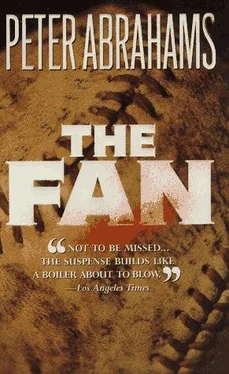Peter Abrahams - The Fan
Здесь есть возможность читать онлайн «Peter Abrahams - The Fan» весь текст электронной книги совершенно бесплатно (целиком полную версию без сокращений). В некоторых случаях можно слушать аудио, скачать через торрент в формате fb2 и присутствует краткое содержание. Жанр: Триллер, на английском языке. Описание произведения, (предисловие) а так же отзывы посетителей доступны на портале библиотеки ЛибКат.
- Название:The Fan
- Автор:
- Жанр:
- Год:неизвестен
- ISBN:нет данных
- Рейтинг книги:4 / 5. Голосов: 1
-
Избранное:Добавить в избранное
- Отзывы:
-
Ваша оценка:
- 80
- 1
- 2
- 3
- 4
- 5
The Fan: краткое содержание, описание и аннотация
Предлагаем к чтению аннотацию, описание, краткое содержание или предисловие (зависит от того, что написал сам автор книги «The Fan»). Если вы не нашли необходимую информацию о книге — напишите в комментариях, мы постараемся отыскать её.
The Fan — читать онлайн бесплатно полную книгу (весь текст) целиком
Ниже представлен текст книги, разбитый по страницам. Система сохранения места последней прочитанной страницы, позволяет с удобством читать онлайн бесплатно книгу «The Fan», без необходимости каждый раз заново искать на чём Вы остановились. Поставьте закладку, и сможете в любой момент перейти на страницу, на которой закончили чтение.
Интервал:
Закладка:
“Not for an exhausted nine-year-old boy. Physically and emotionally exhausted.”
“Then I’ll just go up and have a peek at him.”
“You will not,” Ellen said.
“He’s my son.”
“That remains to be seen.”
“What do you mean by that?” No reply. Gil stepped into the hall. Did Tim really move to block him? Gil brushed past him, brushed past Ellen too.
“Stop,” Ellen said.
Did she really grab his arm, dig her fingernails through his jacket? That wasn’t her at all. What was going on? He shook her off, kept going toward the stairs. As he went past the entrance to the living room, a woman said, “That’s him.”
He glanced in, saw an old couple sitting on the couch, cups and saucers on their laps. Gil recognized the woman: she was still wearing her Harvard cap.
“Just a minute,” the man said, rising. He was tall, square-shouldered, well but modestly dressed: the picture of all those bullshit Yankee virtues. “I don’t believe Ellen wants you in her house.”
“I don’t believe it’s got anything to do with you.” Gil faced the man.
Ellen grabbed his arm again, but she didn’t use her nails this time. “What is wrong with you? You should be down on your knees thanking these people.”
“That’s not necessary,” said the man.
“On the contrary, Judge,” said Tim. “Who knows what could have happened to Richie?”
Gil turned on Tim. Tim had a smile on his face that Gil had never seen before and didn’t like at all. Gil shoved him against the wall. “Not another word,” he said. Then he climbed the stairs.
There were two bedrooms on the second floor. The first, once his and Ellen’s, now Ellen’s alone, or Ellen’s and Tim’s, who cared? The second, Richie’s. The door was open a few inches, the way Richie liked, or at least the way he had liked it when they had all still been together; and the room was dark inside. Gil went in. A shaft of hall light fell across the bed. Richie lay with his face toward the wall.
“Richie?”
No answer.
“Sorry, pal, if you can hear me. I screwed up, big time.”
No answer. Gil had a strong desire to lay his hand on Richie’s shoulder, or rumple his hair, something. But he might wake him, if Richie was indeed sleeping, might even frighten him. Gil shrank from that second thought.
“Richie?”
No answer.
“I…”
Gil stood in Richie’s room, silent. He could hear the boy’s breathing, light and regular; sound asleep. Above him Bobby Rayburn smiled down from the poster, bat resting easily on his shoulder.
Gil wanted something very simple: to lie down on that bed and fall asleep beside his son. The impossible. He had thanked God for Richie’s safety. Gil had never addressed God before, but now that the ice was broken he made a little prayer, or request.
“Give me the whip hand,” he said.
Richie moaned in his sleep.
Suddenly Gil wondered whether Richie had made the majors.
“Richie?”
No answer.
“Did you hear from the coach?”
Richie moaned again.
9
The ophthalmologist was an old Jewish guy with one of those pendants shaped like the Greek letter pi. They sat in the dark and quiet examination room, the ophthalmologist clicking new lenses through the lens machine, Bobby Rayburn peering through them and reporting what he saw in the illuminated square on the far wall.
“E, W, N, T, R, F.”
Click. “And the line that begins with L?”
“L, P, Z, Y, O, A.”
Click. “Possibly the one below?”
“U, B, D, F, C, R.”
Click. “Better or worse?”
“Worse.”
Click. “Better or worse?”
“Better.”
Click. “Better or worse?”
“About the same.”
The ophthalmologist had bright blue eyes. They came closer, gazed through the pupils of Bobby’s eyes and into their depths. A long black hair curled out of the old man’s right nostril. He rolled back his stool, switched on a desk lamp, wrote on a chart. Bobby watched the pen wiggling in the pool of light, then examined the other light sources in the room-the letters on the wall, his Rolex.
“So, Doc-do I need glasses?”
“Glasses?” The ophthalmologist stopped writing. “Only to make a fashion statement. Your vision is perfect. More than perfect-twenty-fifteen in the right eye and even better in the left. Even better. Almost twenty-ten. Such acuity I find only in children, and then seldom. Glasses? You could qualify as an astronaut or a jet pilot or something of that nature, Mr.-” He checked the chart. “-Rayburn.”
“There’s nothing wrong with my eyes?”
The ophthalmologist pursed his lips. “Quite the opposite. That’s what I’m trying to tell you.” He swung the lens machine out of the way, pointed at the wall. “Read that bottom line, if you please.”
“D, Y, X, C, N, R.”
“You see? You’re the first patient I’ve had in here since January who could do that, and he was a child, not ten years old. You’ve been blessed, Mr.-” Another glance at the chart. “-Rayburn.”
“Then how come I’m not seeing as well as I used to?”
“What makes you think you’re not seeing as well as you used to?”
Bobby didn’t want to go into it. The guy didn’t know who he was or what he did, probably was one of those people who knew nothing about baseball, not even the basics, like balls and strikes. Bobby liked that in a way but it made going into it too difficult. “I don’t know,” he said.
The ophthalmologist smiled a little smile. Bobby didn’t like that smile; he had seen similar ones on the faces of sportswriters. “It’s almost impossible from an optical point of view that you ever saw measurably better than you’re seeing now,” said the ophthalmologist. “Do you follow me?”
“Yes,” Bobby said, although he wasn’t sure he did.
“You’re so close to the theoretical upper limit, the polar opposite of blindness, if you will,” the ophthalmologist continued. “How you interpret visual data, on the other hand, is a different question.”
“What’s that supposed to mean?”
The ophthalmologist’s smile faded. “It means that your physical equipment is fine. Other factors may be influencing the way you see the physical world, or think you are seeing it.”
“What other factors?”
“Lack of sleep. Alcohol abuse. Drug abuse.”
Bobby shook his head to each of those. “What else?”
“Stress.”
“Like?”
“What causes stress?”
Bobby nodded.
“All the usual problems. Money worries, love worries, job worries, sickness in the family, death of someone close. And sometimes good things are stressful too.” The bright blue eyes looked deep into Bobby’s again, probing this time beyond the retinas. “Have you had a period of stress lately?” The long nostril hair quivered like a tendril.
“What do you mean good things? ”
“A promotion. Birth of a child. Winning a lottery. Any big change is stressful.”
“I did sign a new contract,” Bobby said.
“When was that?”
“Last month.”
“Well, then.”
“So when will I start seeing better?”
The ophthalmologist laughed, although Bobby didn’t see what was funny. He looked again at the letters on the bottom line, read them easily. But they were just sitting there on the wall, motionless. What if they were suddenly spinning, and coming toward him fast? Could he identify them then? And how soon?
“It’s easy to read them when they’re not moving,” Bobby said.
“Not moving?” The ophthalmologist fingered his little pi pendant.
Bobby thought of his four-leaf clover, lost in center field. “Never mind.”
The ophthalmologist laid his hand, light and bony, on Bobby’s knee. “Try perhaps to relax,” he said.
Читать дальшеИнтервал:
Закладка:
Похожие книги на «The Fan»
Представляем Вашему вниманию похожие книги на «The Fan» списком для выбора. Мы отобрали схожую по названию и смыслу литературу в надежде предоставить читателям больше вариантов отыскать новые, интересные, ещё непрочитанные произведения.
Обсуждение, отзывы о книге «The Fan» и просто собственные мнения читателей. Оставьте ваши комментарии, напишите, что Вы думаете о произведении, его смысле или главных героях. Укажите что конкретно понравилось, а что нет, и почему Вы так считаете.












